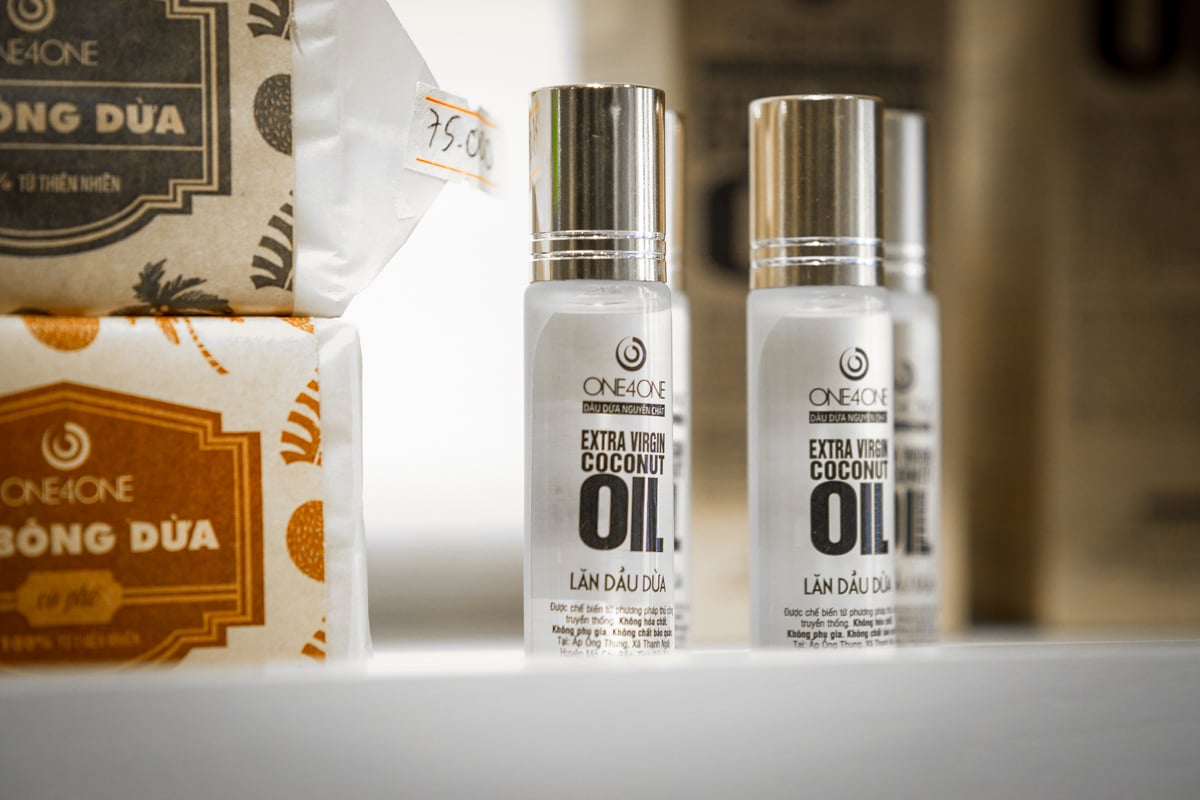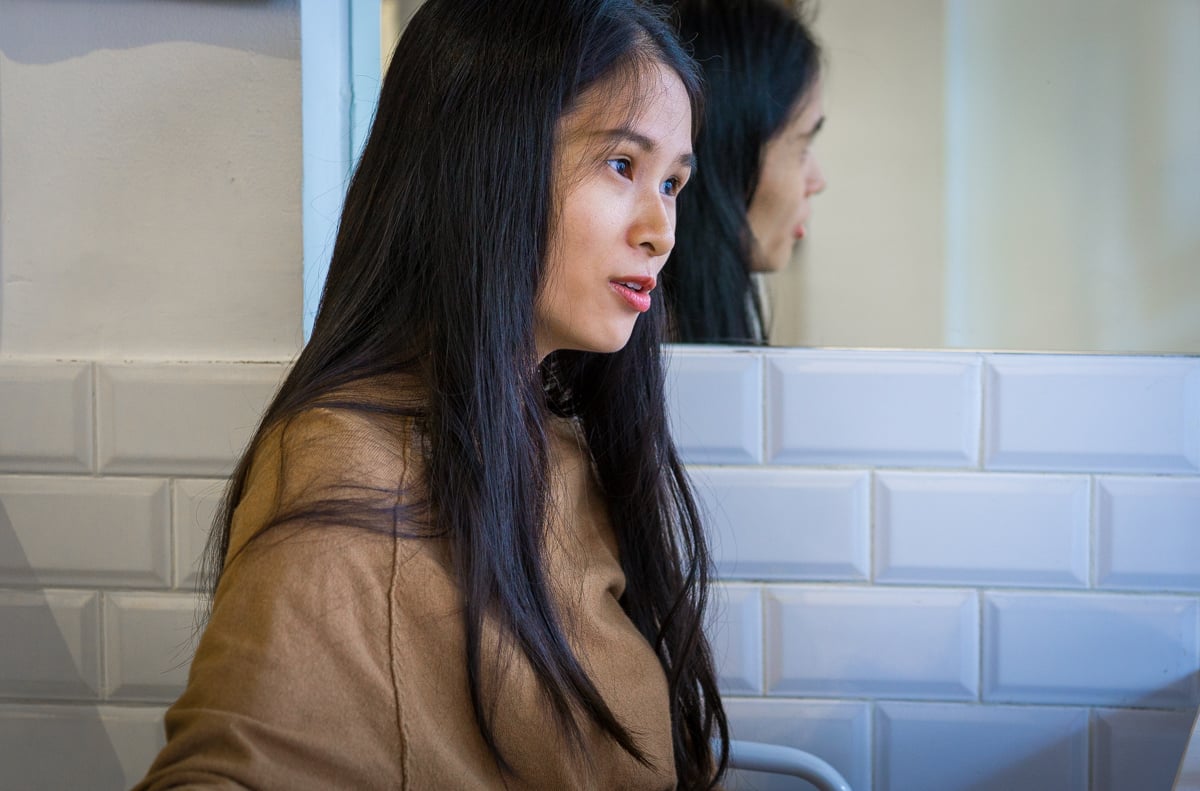One of the brands we love at Vietcetera is One4One, a social enterprise that specializes in high quality coconut oil and products made from coconuts grown and produced right here in Vietnam. As Vietnamese natives, One4One founders Binh and Tuan felt a social responsibility to start a project that gives back to Vietnam amidst waves of environmental devastation and social upheaval. In Vietcetera Cafe, we sell a variety of One4One’s products in proud support of their efforts. To learn more about the beginnings about One4One, we speak with Binh for a bit of Q&A.
Why did you choose to center your Social Enterprise on coconut oil in Ben Tre?
Tuan and his family have been working with coconuts in Ben Tre for over 20 years. Our business comes from things we know about, and the local specialty in Ben Tre which is growing coconuts. Our work is based around community efforts, with help from our family, friends, and hometowns.
We want to start in the place we know best, our hometowns. We know the people and how we can best help the community when we have been inside of it. From working directly with our hometowns, we know how to choose the right people to work with, people whose will and hearts we can trust.

We’re not just creating a product, but a social livelihood that supports entire families. Our company makes contributions back to the community that we harvest coconuts and product oil through environmental efforts and educational opportunities for the underprivileged children.
Our name One4One comes from the idea that we will build our business around: One place we know. One group of people we know. And One product we know.
Why did you choose to work in Ben Tre and Da Nang?
We chose to work in Da Nang because of the land development that is happening in the city, where we see a boom in resorts and other luxury accommodations near the water. Many fishermen in Da Nang do not have the ability to continue their occupations without land to catch and harvest fish. Many of them have tried finding industrial jobs in factories, but there haven’t been enough, so many remain unemployed. Older generations have a harder time finding other work opportunities and feel restricted by new technologies and skills required for these new jobs. They can’t go out into the sea any longer and have no new work, so what can they do?

Development in Da Nang is not very sustainable. Though it looks great from the outside, people in the nearby communities are struggling to adapt from these changes. New companies, hotels and apartments are pushing people out to move into more remote areas with fewer resources available to them. It has resulted in a lot of gambling and alcoholism. The gap between the rich and the poor is growing. I wanted to tackle a small part of this problem, by improving the opportunities of education for children in these impacted families.
We’ve awarded 63 scholarships in Ben Tre and 60 in Da Nang. There are students who have almost nothing to eat, yet somehow keep great grades. We have teachers volunteer with us to identify students at their schools who need the most help, and we pay their school fees and supplies.
I imagine land must be very expensive in Da Nang. Where did you build your company there?
We’re using my house with my parents helping. My parents don’t always understand the work we do, but they’re always very supportive and encouraging. They really believe in me. Whenever I come back to my hometown to work on community projects, my parents always come along to learn about it.

I am from Da Nang, and my family has also been victim to much of the urbanization in Da Nang. We use to have 3000 square meters of land for fishing, but have been downsized to 100 square meters. Since we cannot fish anymore either, we’re working on other projects that we can do with the land we have. In Da Nang, we’re working on a new branch of our company and started making all-natural soap, body care, and lip products.
What is the process of creating coconut oil?
There are two popular methods to creating coconut oil. The traditional way in Vietnam is thermal processing. This is the method we use. First, we remove all the coconut meat, shred it, and then we press the meat so that all the coconut milk escapes. We’ll cook the milk in a large pot until all the water vapor escapes and then we are left with the oil. The heat breaks down specific enzymes in the coconut that releases lots of antioxidants. This is one the advantages to the traditional method that many companies and consumers overlook when they opt for other types of coconut oil production methods.

With cold pressing, a modern industrial method, they keep the temperature low to keep vitamins from escaping. This is a faster method, which is why many large companies opt for this type. However, with their centrifugation method, they are more likely to have spoiled products or oil that doesn’t preserve well. Both methods have clear advantages and disadvantages, for example cold pressing allows many vitamins to stay intact, but heat pressing allows more antioxidants to be released in the oil.
What are some difficulties you’ve faced with your social enterprise?
Everything has taken longer than we had expected. We had to do everything step-by-step: designing the logo and packaging, getting our name out there, creating the product. Excitingly, this is the first year the business has begun to sustained itself without me funding it.
With such a small company, we’re limited on staff. We have positions like marketing, accountant, manager, but we actually do a lot more than that. Each person in our team is multifunctional and we’re always learning on the job because of all the work we have had to overcome to launch this brand.

Working with laborers in rural areas can be challenging and requires a deal of training and patience. We’re committed to the community, so we’re not planning to outsource our workers and would rather take the time to train and prepare the workers in our community.
Who are your main consumers?
Most of the customers are in big cities and we don’t have much reach in rural areas yet. We use the internet marketing and social media expand our reach. We have a store in Hanoi and Da Nang, and our products are sold in different shops like vegan, organic stories and coffee shops.
We don’t mark up our prices much higher than the cost of production because we want it to be accessible to everyone. We don’t think that high quality should only be attainable by rich consumers.
What are your goals with One4One?
I want to do this because I want to motivate people. I want to prove that with a small sum of money, you can make your own business. I started with only $2,000 and after some years, our business now sustains itself.

We don’t want to grow a big company, but a professional one that serves as a model for other social enterprises in Vietnam. It took us a long time to start this project with government paperwork, fees, and developing our product, but that’s because we are some of the first to do this. In the future, we can be helpful in advising similar projects and hopefully inspire people to want to create social enterprises too.
Young people will often leave their hometowns for large cities or other countries to learn and to work, and they rarely move back. Many rural areas don’t have many young people, just kids and the elderly. Vietnamese youth envision a future in cities, and so, many resources are abandoned in rural areas such as land, plants, and agricultural products. I believe that it should be the cooperation of the youth to take back these lands and resources to generate businesses.
Vietnam has a lot of raw products, coffee, almonds, coconuts are exported at very low prices to other countries such as Thailand and China. 40-50% of coconuts in Vietnam are sold to China, for example, where they are processed and sold at much higher retail prices. Sometimes countries buy our resources and just print their brand and country on it.
Who should we speak to next?
My friend started a business that bakes banana cakes. Today, her business supports 20 other women and their banana groves. She wanted to protect the banana plants in Dong Thap from deforestation.
